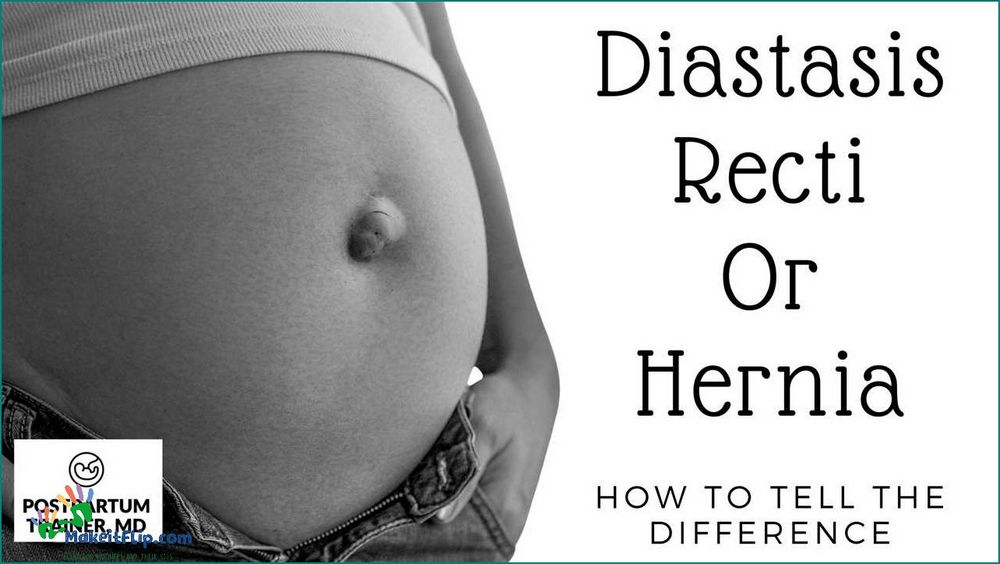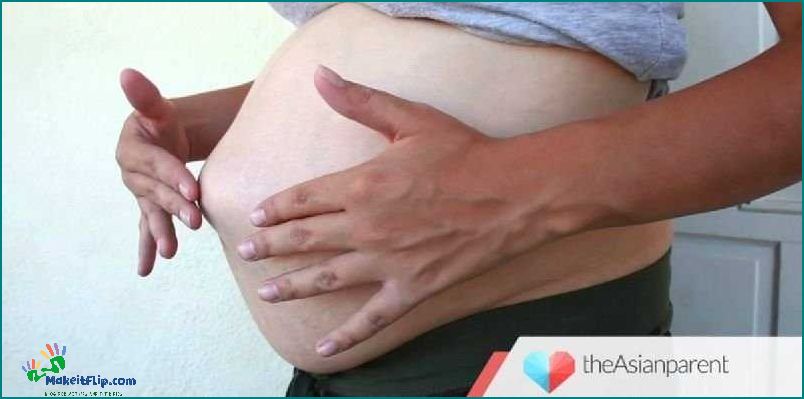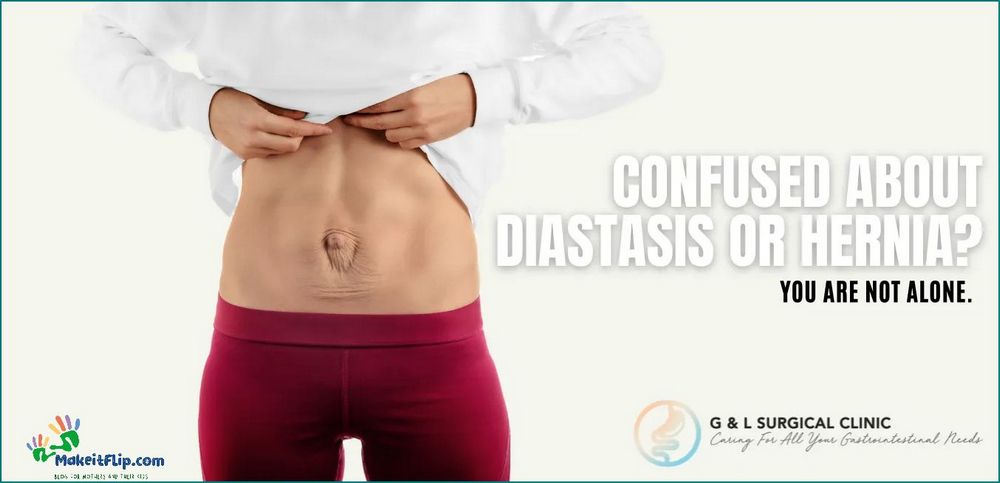Contents
Causes, Symptoms, and Treatment of Hernia After Pregnancy: A Comprehensive Guide

During pregnancy, a woman’s body undergoes significant changes, including stretching of the abdominal muscles to accommodate the growing baby. This stretching can weaken the muscles and increase the risk of developing a hernia after pregnancy. A hernia occurs when an organ or fatty tissue protrudes through a weak spot or tear in the surrounding muscle or connective tissue.
Common causes of hernias after pregnancy include the strain placed on the abdominal muscles during childbirth, as well as the hormonal changes that occur during pregnancy. These factors can weaken the muscles and make them more susceptible to herniation. Additionally, certain activities or lifting heavy objects too soon after giving birth can also increase the risk of developing a hernia.
The symptoms of a hernia after pregnancy can vary depending on the location and size of the hernia. Common symptoms include a visible bulge or lump in the affected area, pain or discomfort, especially when lifting or straining, and a feeling of heaviness or pressure in the abdomen. In some cases, a hernia may cause no symptoms at all, making it important to seek medical attention if you suspect you may have a hernia.
Treatment for a hernia after pregnancy may involve both non-surgical and surgical options. Non-surgical treatment options include wearing a supportive garment, such as a hernia belt, to help support the weakened muscles and reduce discomfort. However, in many cases, surgery may be necessary to repair the hernia and prevent complications. Surgery for a hernia after pregnancy is typically performed using minimally invasive techniques, which can help to minimize scarring and promote faster recovery.
Recovery after hernia surgery can vary depending on the individual and the type of surgery performed. It is important to follow your doctor’s instructions for post-operative care, including avoiding heavy lifting and strenuous activities during the recovery period. Complications from hernia surgery are rare but can include infection, bleeding, and recurrence of the hernia. It is important to discuss any concerns or questions with your healthcare provider.
Causes of hernia after pregnancy
During pregnancy, the abdominal muscles undergo significant stretching and weakening to accommodate the growing baby. After giving birth, it takes time for these muscles to recover and regain their strength. This weakened state of the abdominal muscles can increase the risk of developing a hernia.
A hernia occurs when an organ or tissue pushes through a weak spot in the surrounding muscles or connective tissue. In the case of hernia after pregnancy, the weakened abdominal muscles can create openings through which organs, such as the intestines, can protrude.
Complications during pregnancy, such as multiple pregnancies, excessive weight gain, or a difficult labor, can also contribute to the development of a hernia. These factors put additional strain on the abdominal muscles, making them more susceptible to herniation.
In some cases, a hernia may develop immediately after pregnancy, while in others, it may take several months or even years for symptoms to appear. It is important for women to be aware of the signs and symptoms of a hernia and seek medical attention if they experience any discomfort or changes in their abdominal area.
Treatment for hernia after pregnancy may involve surgery to repair the weakened muscles and close the hernia opening. This can help alleviate symptoms and prevent further complications. However, it is important for women to consult with their healthcare provider to determine the best course of action based on their individual circumstances.
| Causes of hernia after pregnancy: |
|---|
| – Weakened abdominal muscles |
| – Complications during pregnancy |
| – Multiple pregnancies |
| – Excessive weight gain |
| – Difficult labor |
Weakening of abdominal muscles
During pregnancy, the abdominal muscles undergo significant stretching and weakening to accommodate the growing fetus. This stretching can lead to a condition known as diastasis recti, where the abdominal muscles separate and create a gap in the midline of the abdomen. This weakened abdominal wall can increase the risk of developing a hernia after pregnancy.
Complications during pregnancy, such as multiple pregnancies or excessive weight gain, can further contribute to the weakening of the abdominal muscles. Additionally, hormonal changes that occur during pregnancy can also affect the strength and elasticity of the muscles.
After pregnancy, it is important to take measures to strengthen the abdominal muscles and prevent the development of a hernia. This can be achieved through exercises specifically targeting the abdominal muscles, such as pelvic tilts, abdominal bracing, and kegel exercises. It is recommended to consult with a healthcare professional or a physical therapist for guidance on appropriate exercises and techniques.
In some cases, if the weakening of the abdominal muscles is severe and causing significant discomfort or complications, surgery may be necessary to repair the abdominal wall. This surgical procedure, known as abdominoplasty or tummy tuck, involves tightening the abdominal muscles and removing excess skin and fat.
Overall, it is important for women to be aware of the potential weakening of the abdominal muscles after pregnancy and take proactive steps to prevent or address any complications, such as hernias. Maintaining a healthy lifestyle, including regular exercise and proper nutrition, can also help support the strength and integrity of the abdominal muscles.
Increased pressure on the abdomen

During pregnancy, the growing uterus puts increased pressure on the abdomen, causing the abdominal muscles and connective tissues to stretch. This stretching can weaken the abdominal wall and increase the risk of developing a hernia.
After pregnancy, the abdominal muscles and tissues may take time to recover and regain their strength. This can further contribute to the development of a hernia. Additionally, the strain of childbirth itself can also lead to the formation of a hernia.
In some cases, a hernia may resolve on its own without the need for surgery. However, if the hernia is causing significant discomfort or complications, surgical intervention may be necessary. Surgery for a hernia after pregnancy typically involves repairing the weakened abdominal wall and reinforcing it with mesh or sutures.
It is important to note that recovery after hernia surgery can vary from person to person. It may take several weeks or even months for the abdominal muscles to fully heal and for normal activities to be resumed. It is important to follow the surgeon’s post-operative instructions and to avoid any activities that may strain the abdominal muscles during the recovery period.
If you experience symptoms such as pain, swelling, or a bulge in the abdominal area after pregnancy, it is important to consult a healthcare professional for an accurate diagnosis and appropriate treatment. Early detection and treatment of a hernia can help prevent further complications and promote a faster recovery.
| Causes | Symptoms | Treatment |
|---|---|---|
| Increased pressure on the abdomen | Pain, swelling, bulge in the abdominal area | Surgery, hernia repair, mesh or sutures |
Hormonal changes during pregnancy

During pregnancy, a woman’s body undergoes significant hormonal changes to support the growth and development of the baby. These hormonal changes can have various effects on different parts of the body, including the abdominal muscles.
One of the main hormones involved in pregnancy is relaxin. This hormone helps to relax and soften the ligaments and tissues in the pelvis, allowing for stretching and expansion as the baby grows. However, relaxin can also affect the abdominal muscles, making them more susceptible to stretching and weakening.
As the uterus expands during pregnancy, it puts pressure on the abdominal muscles. This can cause the muscles to stretch and separate, a condition known as diastasis recti. Diastasis recti can weaken the abdominal muscles and increase the risk of developing a hernia.
After pregnancy, the abdominal muscles need time to recover and regain their strength. However, hormonal changes can continue to affect the muscles, making it more difficult for them to fully recover. This can lead to complications such as persistent diastasis recti or the development of a hernia.
In some cases, surgery may be necessary to repair the abdominal muscles and treat a hernia. This can involve suturing the muscles back together and reinforcing them with mesh to provide additional support. However, surgery is typically only recommended if conservative treatment options have been unsuccessful.
It is important for women to be aware of the hormonal changes that occur during pregnancy and the potential impact on their abdominal muscles. Taking steps to support muscle recovery, such as gentle exercises and avoiding heavy lifting, can help reduce the risk of developing complications like a hernia.
Symptoms of hernia after pregnancy

During pregnancy, the abdominal muscles stretch to accommodate the growing baby. This stretching can weaken the muscles and increase the risk of developing a hernia after pregnancy. A hernia occurs when an organ or tissue pushes through a weak spot in the abdominal wall.
Some common symptoms of a hernia after pregnancy include:
- Bulge or lump: A noticeable bulge or lump in the abdominal area may be a sign of a hernia. This bulge may become more prominent when coughing, sneezing, or lifting heavy objects.
- Pain or discomfort: Hernias can cause pain or discomfort in the affected area. This pain may worsen with physical activity or prolonged standing.
- Pressure or heaviness: Some women may experience a feeling of pressure or heaviness in the abdomen, especially after giving birth.
- Difficulty with bowel movements: A hernia can sometimes affect the normal functioning of the intestines, leading to constipation or difficulty with bowel movements.
- Heartburn or acid reflux: In some cases, a hernia after pregnancy can cause heartburn or acid reflux due to the displacement of the stomach.
If you experience any of these symptoms after pregnancy, it is important to consult with a healthcare professional for an accurate diagnosis. In some cases, surgery may be necessary to repair the hernia and alleviate symptoms. The recovery process after hernia surgery can vary, but most women can expect to gradually resume normal activities within a few weeks to a couple of months after the procedure.
Visible bulge or lump

One of the most common symptoms of a hernia after pregnancy is a visible bulge or lump in the abdominal area. This bulge or lump is caused by the protrusion of organs or tissues through a weakened area in the abdominal muscles.
During pregnancy, the abdominal muscles stretch to accommodate the growing baby. After pregnancy, these muscles may not fully recover their strength, leaving them weakened and more prone to complications such as a hernia.
When a hernia occurs, the weakened muscles allow organs or tissues to push through, creating a visible bulge or lump. This bulge or lump may be more noticeable when standing or straining, and it may disappear when lying down or relaxing.
If you notice a visible bulge or lump in your abdominal area after pregnancy, it is important to consult with a healthcare professional. They can diagnose the hernia and recommend the appropriate treatment, which may include surgery to repair the weakened muscles and prevent further complications.
FAQ about topic Hernia after pregnancy Causes Symptoms and Treatment
What is a hernia?
A hernia is a condition where an organ or tissue pushes through a weak spot in the surrounding muscle or connective tissue.
Can pregnancy cause a hernia?
Yes, pregnancy can increase the risk of developing a hernia. The growing uterus puts pressure on the abdominal muscles, which can weaken them and lead to a hernia.
What are the symptoms of a hernia after pregnancy?
The symptoms of a hernia after pregnancy may include a bulge or lump in the abdomen or groin area, pain or discomfort, and a feeling of heaviness or pressure in the affected area.
How is a hernia after pregnancy treated?
The treatment for a hernia after pregnancy may include lifestyle changes, such as avoiding heavy lifting and straining, wearing a supportive garment, and physical therapy exercises. In some cases, surgery may be necessary to repair the hernia.
Can a hernia after pregnancy go away on its own?
No, a hernia after pregnancy will not go away on its own. It may require medical intervention, such as surgery, to repair the hernia and alleviate symptoms.
I’m Diana Ricciardi, the author behind Makeitflip.com. My blog is a dedicated space for mothers and their kids, where I share valuable insights, tips, and information to make parenting a bit easier and more enjoyable.
From finding the best booster seat high chair for your child, understanding the connection between sciatica and hip pain, to exploring the benefits of pooping in relieving acid reflux, I cover a range of topics that are essential for every parent.
My goal is to provide you with practical advice and solutions that you can easily incorporate into your daily life, ensuring that you and your child have the best possible experience during these precious years.
